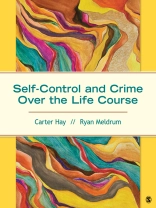What exactly is self-control, and what life outcomes does it affect? What causes a person to have high or low self-control to begin with? What effect does self-control have on crime and other harmful behavior?
Using a clear, conversational writing style, Self-Control and Crime Over the Life Course answers critical questions about self-control and its importance for understanding criminal behavior. Authors Carter Hay and Ryan Meldrum use intuitive examples to draw attention to the close connection between self-control and the behavioral choices people make, especially in reference to criminal, deviant, and harmful behaviors that often carry short-term benefits but long-term costs. The text builds an overall theoretical perspective that conveys the multi-disciplinary nature of modern-day self-control research. Moreover, far from emphasizing only theoretical issues, the authors place public policy at the forefront, using self-control research to inform policy efforts that reduce the societal costs of low self-control and the behaviors it enables.
Daftar Isi
Chapter 1: Introduction
A Definition of Self-Control
An Integrative Approach
A Life Course Approach
Connecting Self-Control to Other Causes of Behavior
Attention to Public Policy
Connecting the Science of Self-Control to the Stories We Read About Everyday
Chapter 2: Theories of Self-Control and Behavior
The Inextricable Connection Between Theory and Fact
Explaining Crime: Gottfredson and Hirschi′s Self-Control Theory
Evaluating Gottfredson and Hirschi′s Self-Control Theory
A Psychological, Trait-Based Theory of Self-Control
Biosocial Approaches to Behavior
The Strength Model: Self-control as a Depletable Resource
Chapter 3: What Are the Consequences of Low Self-Control?
The Marshmallow Experiments
A Quick Note on the Measurement of Self-Control
Research on Low Self-Control and Crime
The Everyday Consequences of Low Self-Control
Policy Implications and Possibilities
Chapter 4: Infancy and Childhood: What Are the Causes of Self-Control Early in Life?
The Role of Parents in Shaping Self-Control
The Genetic Underpinnings of Self-Control
Neurobiological Influences on Self-Control
Policy Implications and Possibilities
Chapter 5: Adolescence and Adulthood: Is Self-Control Stable Over Time?
Stability and Change in Self-Control
Why Does Self-Control Often Remain Stable?
Persistent Individual Traits as Contributors to Self-Control Stability
Persistent Environmental Characteristics: Parenting and Peers
Persistent Environmental Characteristics: The Stability of Poverty
State Dependence as a Contributor to Self-Control Stability
An Implicit Idea: Human Agency
Empirical Evidence on Explanations for Stability
Policy Implications and Possibilities
Chapter 6: What Leads to Self-Control Change?
The Pervasiveness of Change
The Transformations of Adolescence
Unexpected Shifts in Social Environments and Relationships
Sleeping, Eating, and Substance Use: Short-Term Fluctuations in Self-Control
Policy Implications and Possibilities
Chapter 7: Do the Harmful Effects of Low Self-Control Vary Across Different Circumstances?
Conditional Causation and Low Self-Control: Conceptual Issues
Criminal Opportunity
Association With Delinquent Peers
Weak Social Bonds
Neighborhood Disadvantage
Weak Moral Values
Considering Self-Control as a Moderator Variable
Can Self-Control Moderate the Effects of Self-Control?
Policy Implications and Possibilities
Chapter 8: Self-Control and Crime Over the Life Course: Bringing It All Together
The Causes of Initial Self-Control Differences in the First Decade of Life
The Child Grows into an Adolescent
The Adolescent Grows Into an Adult
Moderated Effects Across the Entire Life Course
Chapter 9: Self-Control and Crime: Influencing Policy and Looking to the Future
Self-Control as a Driver of Societal Advance
Using Policy to Promote Self-Control Over the Life Course
Community-Based Programs Relevant to All Stages of the Life Course
Evidence of Program Success
Tentang Penulis
Dr. Ryan C. Meldrum is an Associate Professor and the Director of Research and Communications in the Department of Criminology and Criminal Justice at Florida International University. He received his B.S. in Sociology from Oregon State University and his M.S. and Ph.D. in Criminology from Florida State University. His research foci encompass various aspects of juvenile delinquency and young adult offending, with his current work concentrated in three areas: the causes and consequences of low self-control, the health consequences of a lack of sleep among teenagers, and racial and ethnic disparities in school discipline and juvenile justice sanctioning among youth. His research has been published in outlets including Criminology, Journal of Research in Crime and Delinquency, Justice Quarterly, Journal of Criminal Justice, Journal of Quantitative Criminology, Criminal Justice and Behavior, Crime & Delinquency, Journal of Youth and Adolescence, Sleep Health, Intelligence, and Preventive Medicine. He also co-authored the book Self-Control and Crime over the Life Course. For his research contributions as a junior scholar, he was awarded the 2016 Academy of Criminal Justice Sciences (ACJS) New Scholar Award.












